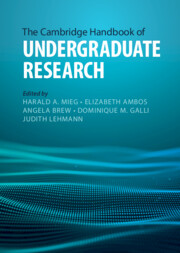Book contents
- The Cambridge Handbook of Undergraduate Research
- The Cambridge Handbook of Undergraduate Research
- Copyright page
- Contents
- Figures
- Tables
- Contributors
- Foreword
- Foreword
- 1 Introduction
- Part I Theory and Research on Undergraduate Research
- Part II Implementation, Approaches, Methods
- Part III Disciplines
- Part IV International Perspective
- 47 Introduction
- Part IV.1 Americas
- Part IV.2 Africa & Middle East
- Part IV.3 Asia & Oceania
- Part IV.4 Europe
- 64 Undergraduate Research in Austria
- 65 Undergraduate Research in France
- 66 Undergraduate Research in Germany
- 67 Undergraduate Research in Italy
- 68 Undergraduate Research in the Netherlands
- 69 Undergraduate Research in Portugal
- 70 Undergraduate Research in Russia
- 71 Undergraduate Research in Scandinavia
- 72 Undergraduate Research in the UK
- Part V Avenues for Developing Undergraduate Research
- Index
- References
70 - Undergraduate Research in Russia
New Learning Requirements in a New World
from Part IV.4 - Europe
Published online by Cambridge University Press: 11 August 2022
- The Cambridge Handbook of Undergraduate Research
- The Cambridge Handbook of Undergraduate Research
- Copyright page
- Contents
- Figures
- Tables
- Contributors
- Foreword
- Foreword
- 1 Introduction
- Part I Theory and Research on Undergraduate Research
- Part II Implementation, Approaches, Methods
- Part III Disciplines
- Part IV International Perspective
- 47 Introduction
- Part IV.1 Americas
- Part IV.2 Africa & Middle East
- Part IV.3 Asia & Oceania
- Part IV.4 Europe
- 64 Undergraduate Research in Austria
- 65 Undergraduate Research in France
- 66 Undergraduate Research in Germany
- 67 Undergraduate Research in Italy
- 68 Undergraduate Research in the Netherlands
- 69 Undergraduate Research in Portugal
- 70 Undergraduate Research in Russia
- 71 Undergraduate Research in Scandinavia
- 72 Undergraduate Research in the UK
- Part V Avenues for Developing Undergraduate Research
- Index
- References
Summary
Student undergraduate research experience is a priority for higher education in Russia. The national long-term social and economic development document states that project-based learning is central to preparing students for the realities of the professional world. New government educational standards were developed to provide universities with the flexibility to introduce key undergraduate research activities to their curricula. This chapter gives a brief overview of the national higher education system in Russia, describes the administrative and cultural framework for undergraduate research, presents best practice examples, and provides an outlook on possibilities for future development.
Keywords
- Type
- Chapter
- Information
- The Cambridge Handbook of Undergraduate Research , pp. 632 - 637Publisher: Cambridge University PressPrint publication year: 2022

